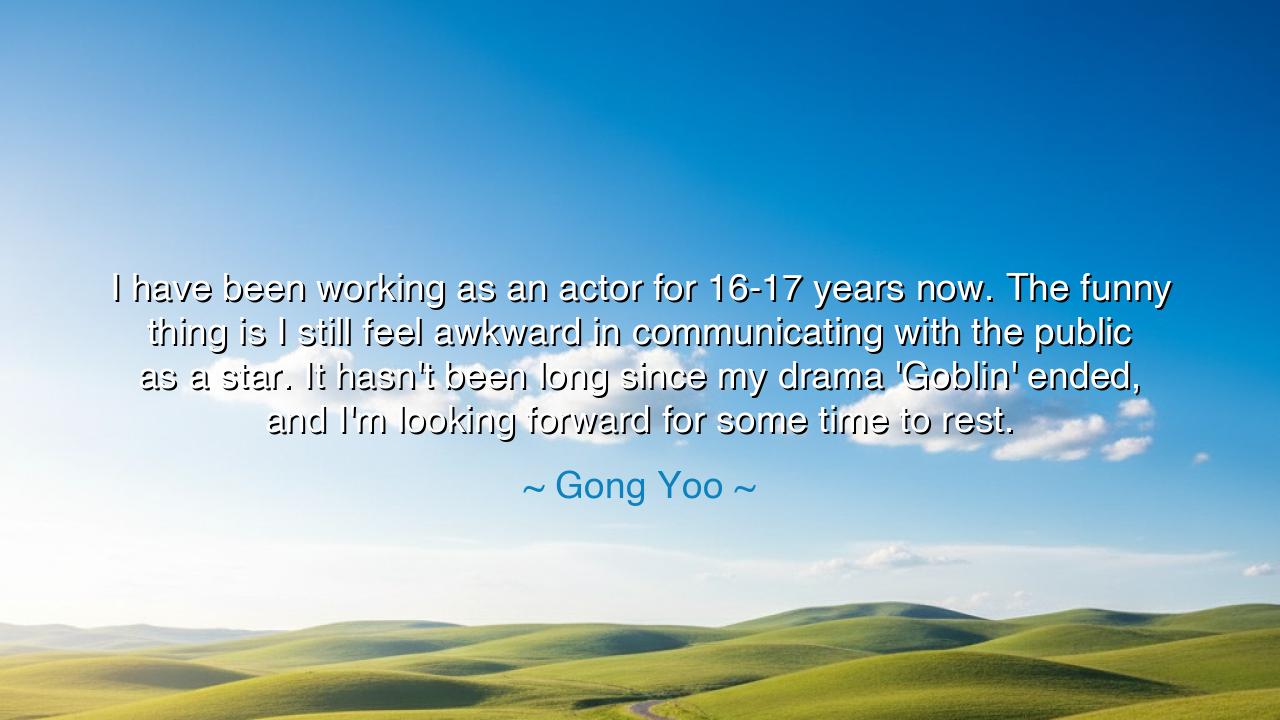
I have been working as an actor for 16-17 years now. The funny
I have been working as an actor for 16-17 years now. The funny thing is I still feel awkward in communicating with the public as a star. It hasn't been long since my drama 'Goblin' ended, and I'm looking forward for some time to rest.






The actor Gong Yoo, known for his quiet grace and powerful performances, once confessed: “I have been working as an actor for 16-17 years now. The funny thing is I still feel awkward in communicating with the public as a star. It hasn’t been long since my drama ‘Goblin’ ended, and I’m looking forward for some time to rest.” In these humble words lies a truth that transcends fame — the truth that even those who stand beneath the brightest lights may still long for silence. His reflection speaks not only to the burden of celebrity, but to the deeper struggle of all souls who must balance duty and rest, public image and inner peace.
In the eyes of the world, the actor shines like a constellation, distant and eternal. Yet behind the glow is a man — weary, human, uncertain. Gong Yoo’s confession of awkwardness is the voice of one who has walked long among crowds and yet kept his solitude intact. It is a rare honesty, for in an age that worships visibility, to admit discomfort with fame is a quiet act of rebellion. Like the philosophers of old who withdrew from courts and kingdoms to find their truth, he reminds us that authenticity is not found in applause, but in stillness.
Let us look to history, for it has seen many such souls. The Roman emperor Marcus Aurelius, though ruler of the known world, often wrote in his private journal of his yearning for peace: “Men seek retreats for themselves — in the country, by the sea, in the mountains — but nowhere can a man find a quieter or more untroubled retreat than in his own soul.” So too does Gong Yoo’s voice echo that same wisdom: after years of mastery in his craft, he seeks not more acclaim, but a return to quietude, to the sacred simplicity of rest. It is the ancient rhythm of all creators — to rise, to labor, to shine, and then to withdraw, so that the heart may breathe again.
The awkwardness in communicating with the public that he describes is not shyness but humility — a rare humility that the ancients would have called sophrosyne, the virtue of moderation and self-awareness. For he understands that the image of a “star” is but a reflection, not the essence. The true man behind the fame belongs not to the gaze of others, but to the silence of his own spirit. There is wisdom in his discomfort, for it guards him against the intoxication of glory. As the great sage Lao Tzu wrote, “He who stands on tiptoe does not stand firm.” Gong Yoo’s modesty, then, is not weakness — it is balance.
Even the divine heroes of legend knew this need for repose. After ten years of war, even Odysseus, the cunning king of Ithaca, longed not for more battles, but for home — for the quiet hearth, the gentle voice of his wife, the peace of familiar shores. In every age, the true measure of greatness is not how loudly one can command attention, but how deeply one can return to humility after triumph. The desire for rest, as Gong Yoo expresses, is the soul’s yearning to remember itself — to return from illusion to truth.
And yet, the world seldom understands such longing. It demands constant visibility, endless performance, the unbroken smile of the “star.” But Gong Yoo’s words remind us that the self must not be consumed by the role. The actor who forgets to rest loses his spirit; the warrior who forgets to sheath his sword becomes a beast. In every craft, there must be balance — between work and reflection, between giving and renewal. Rest, then, is not idleness; it is a sacred act of preservation.
So, what lesson shall we take from these words of quiet strength? It is this: Do not fear stillness. Do not mistake rest for weakness or humility for lack of ambition. When your work is done, step back. When the noise grows too loud, return to the quiet places that remind you who you are. Speak with honesty, even if it reveals awkwardness, for truth spoken softly has more power than flattery shouted loudly. The wise know that peace is not found at the height of success, but in the calm that follows it.
And so, dear listener, remember the example of Gong Yoo — the actor who, after triumph, chose rest over spectacle, authenticity over illusion. Let his words echo through your heart as a gentle teaching: labor with devotion, speak with sincerity, and when the time comes, rest without guilt. For only in the rhythm of effort and repose does the spirit remain whole — and only through such balance can one truly live, not as a “star,” but as a complete and luminous human soul.






AAdministratorAdministrator
Welcome, honored guests. Please leave a comment, we will respond soon